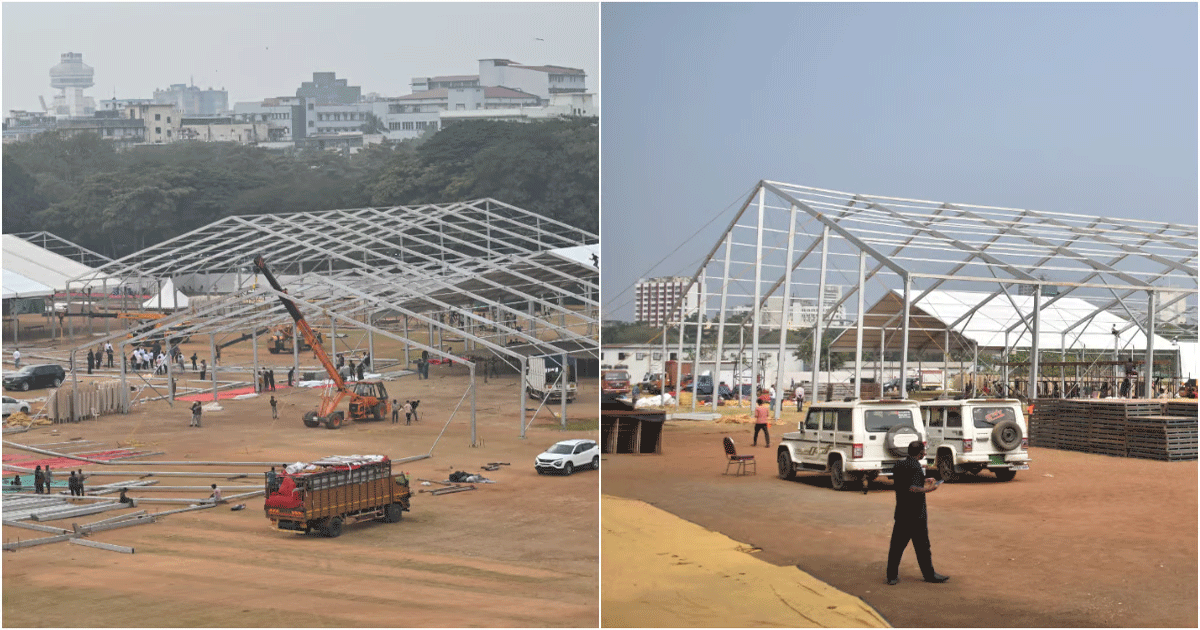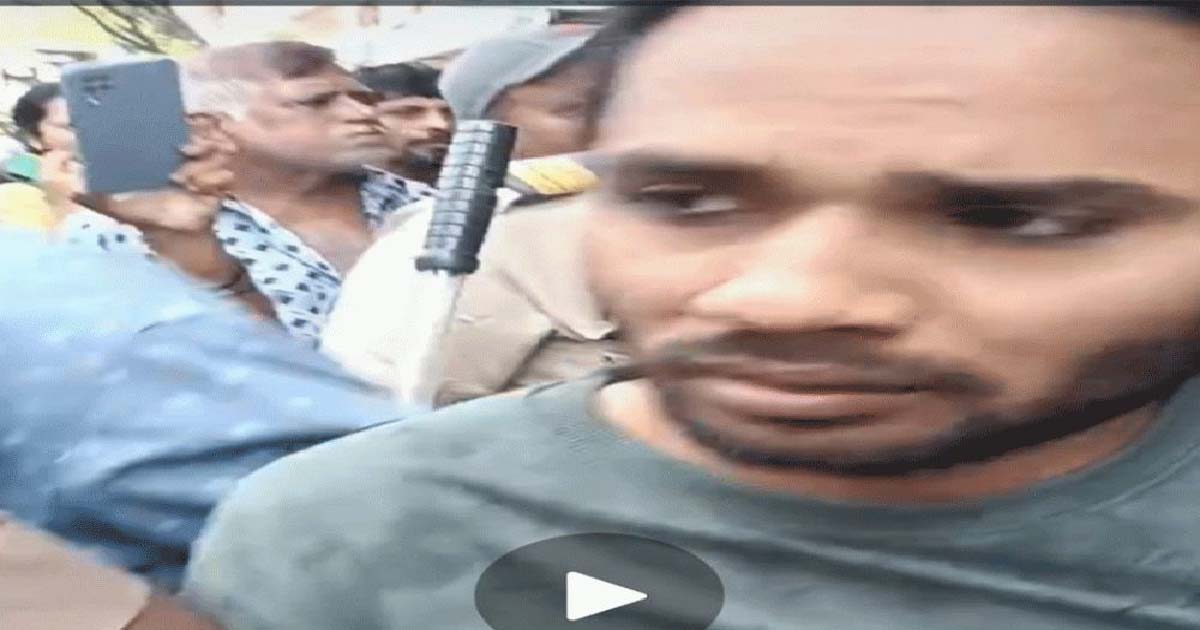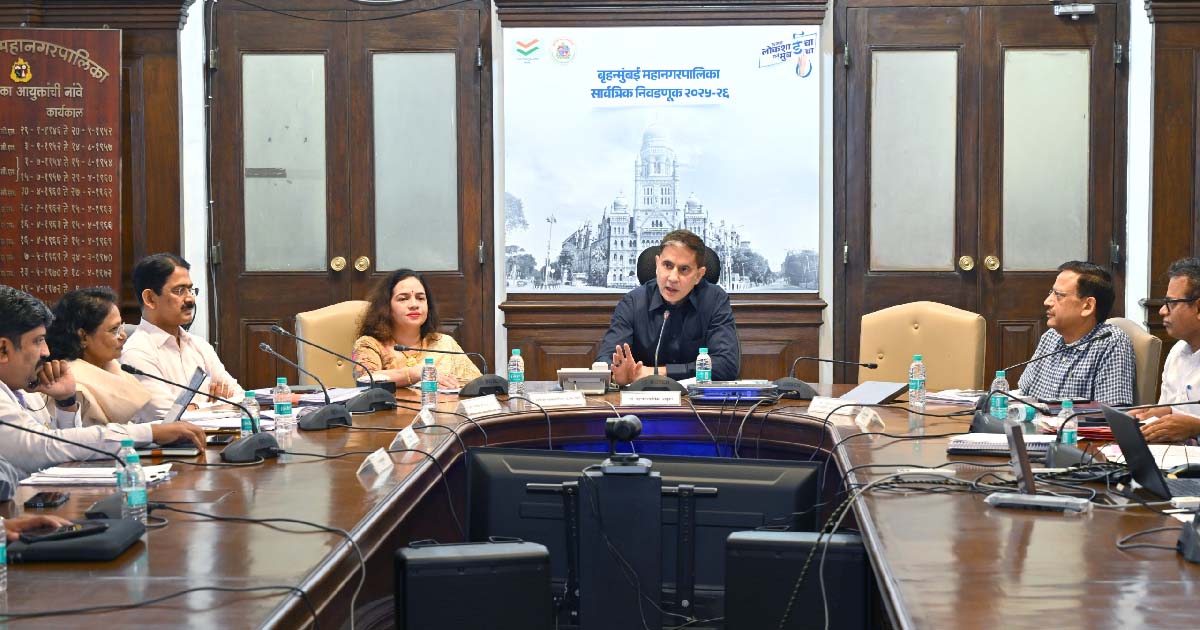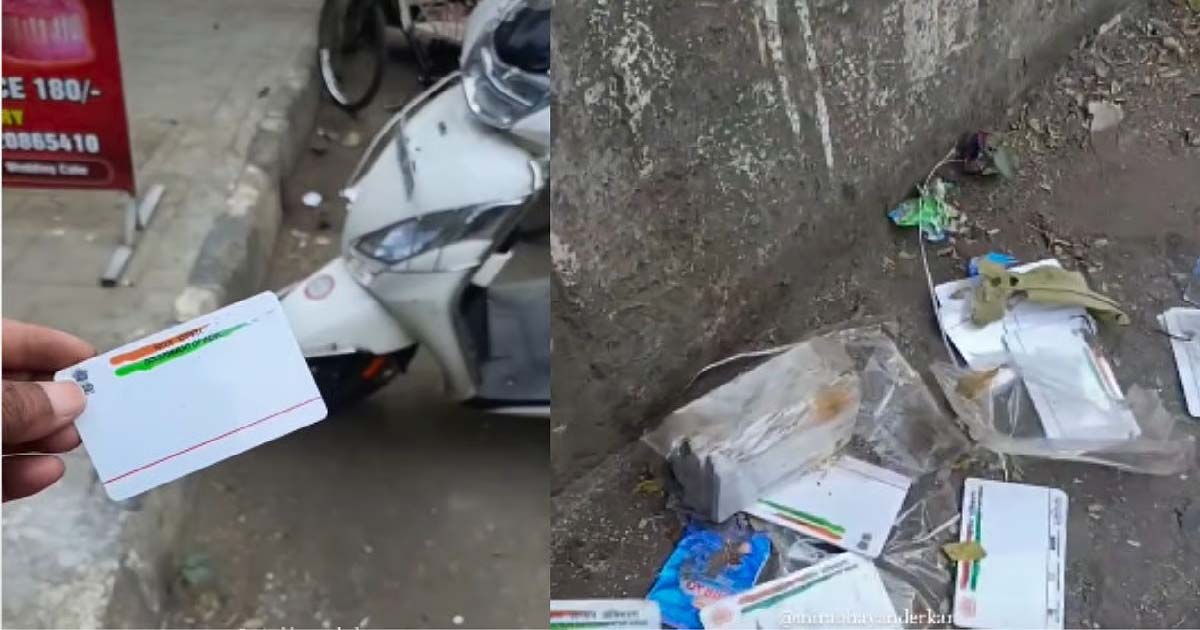Maharashtra
Maharashtra: PM Modi To Preside Over Mahayuti Swearing-In Ceremony As Devendra Fadnavis Gears Up For Third Stint As CM

Azad Maidan in Mumbai, just across from the BMC headquarters, is set to witness an electrifying gathering this evening as Prime Minister Narendra Modi arrives to preside over the swearing-in of the newly elected BJP-led Mahayuti government in Maharashtra.
The event, slated for 5:30 pm, will mark a significant political moment, with only Chief Minister Devendra Fadnavis and two deputy chief ministers taking their oaths at this stage. The event promises to be grand and is expected to host around 2,000 VVIPs and an estimated 40,000 BJP supporters—a testament to the political clout and support Fadnavis commands. Full details regarding the cabinet composition and portfolio assignments are expected to be finalized later.
Final Cabinet
While Fadnavis prepares to step into the role of chief minister for the third time, the final cabinet blueprint remains uncertain. Earlier on Wednesday morning, the political drama in Maharashtra, spanning over 11 days, reached its conclusion with the BJP leadership naming Devendra Fadnavis as its choice for Chief Minister. The announcement came after an intense period of speculation following the Mahayuti alliance’s decisive victory in the state assembly elections held on November 20. The air was thick with anticipation as party leaders, stakeholders, and even the public waited for clarity on who would lead India’s financial capital into its next chapter.
In his address at the legislature party meeting, Fadnavis, who has become synonymous with the BJP’s successful runs in Maharashtra, expressed heartfelt gratitude. He credited the alliance’s success to Prime Minister Narendra Modi’s leadership and underscored the slogans that have now become rallying cries: “Ek Hai To Safe Hai” and “Modi Hai To Mumkin Hai.” These words encapsulate the confidence and unity the party aims at projecting since its landslide victory.
“I bow before the people for giving us such a massive mandate,” Fadnavis said, acknowledging the people’s faith that has paved his way to the Chief Minister’s seat. The process leading up to this moment involved a meeting of the party’s core committee, where key figures such as state BJP unit chief Chandrashekhar Bawankule, senior leaders like Raosaheb Danve, and even former Chief Ministers like Ashok Chavan deliberated on the final decision.
In attendance were BJP stalwarts Sudhir Mungantiwar, Pankaja Munde, and Ashish Shelar, as well as central observers like Union Finance Minister Nirmala Sitharaman and ex-CM of Gujarat, Vijay Rupani. The proposal for Fadnavis’ nomination was put forward by Rupani and unanimously approved by all senior members, reinforcing his position as the party’s top pick. Following the legislative announcement, Fadnavis met with Maharashtra Governor CP Radhakrishnan at Raj Bhavan. The Governor formally invited him to form the next government.
Addressing the press afterward, Fadnavis was succinct and strategic. “I have full faith that he will stand by us… We will fulfill the promises made to the people of Maharashtra,” he asserted. The role of governance, he emphasized, would be collective, with every decision taken by a consensus-driven leadership structure. A defining moment came when Fadnavis addressed Eknath Shinde, whose faction of Shiv Sena played a critical role in shaping the current political landscape.
“I met Eknath Shinde yesterday and told him that it is the wish of both the Shiv Sena and Mahayuti members that he should be with us in this government. I have full faith that he will be with us,” Fadnavis said, hinting at an inclusive governance model that blends the diverse strands of the alliance.
Cheeky Banter
Adding a note of levity, a cheeky exchange at Raj Bhavan sparked laughter. When asked about the oath-taking ceremony, Shinde joked about waiting until evening, to which Ajit Pawar playfully responded, “I will take it and not wait.” To this, Shinde quipped that Ajit Pawar has experience in taking an oath both in the morning and evening. The remark was a nod to their prior, dramatic stint in 2019, when the duo had briefly assumed office before the alliance crumbled within hours. The back-and-forth was a reminder of Maharashtra’s turbulent political history and the seasoned wits of its players.
Third Term
Fadnavis’ journey has been marked by twists and turns. In 2014, at age 44, he made history as Maharashtra’s Chief Minister, being the second youngest to do so after Sharad Pawar. That tenure, though significant, ended in a rift with the Shiv Sena in 2019 over a power-sharing dispute, leading to a brief, 80-hour government that collapsed when Ajit Pawar rejoined the NCP. In 2022, after Eknath Shinde’s rebellion brought down the Maha Vikas Aghadi (MVA) government, Fadnavis was expected to take over the CM’s post but settled for the Deputy Chief Minister role under Shinde.
This third term, therefore, represents a moment of redemption and a culmination of years of political maneuvering. The BJP’s resounding success in the elections—132 out of 149 seats contested—underscored the strong support from the RSS and the organizational machinery that has propelled Fadnavis into the state’s top seat once again. His leadership is expected to bring continuity, stability, and an ambitious agenda aimed at consolidating the BJP’s stronghold and fulfilling the promises made to the electorate.
As the countdown to the swearing-in ceremony begins, the question looms: can Devendra Fadnavis use this third term to transform his political aspirations into a legacy of effective governance? The state watches with bated breath, ready for the next chapter in Maharashtra’s political saga.
Maharashtra
Mumbai: Rickshaw driver beaten up in Vikhroli on suspicion of child theft, burqa-clad driver did this to collect fare, police claim

Mumbai: Vikhroli Park Site, after the rumor of a child theft, chaos broke out and an auto rickshaw driver was attacked by a mob when he went to the street of Vikhroli Madina Masjid dressed in a burqa to collect his fare. During this, people suspected that the child had come to steal, after which the mob beat him up, but the police reached the spot and then took him into their custody. During interrogation, it was found that the child had not come wearing a burqa to steal but to collect the fare. He was dressed in a burqa so that no one would recognize him and he could easily collect his fare and go back, but unfortunately, the people caught him and the police took him out of the mob’s possession and safely took him to the police station. After that, the police confirmed that the child had not come to steal. Further investigation is underway in this matter. The police said that along with the investigation, it is also being found out whether he really came to collect the fare or not. He is a thief. Initial investigation has revealed that the child is not a thief. The police have confirmed that the rickshaw driver is not a thief.
Maharashtra
Municipal Corporation in Mumbai is committed to conducting administration and election process in a fearless, free and transparent environment: Bhushan Gagrani

Mumbai: Municipal Corporation Administration and Election System Mumbai Municipal Corporation is committed to conducting the election process for the general elections 2025-26 in a completely fearless, free, transparent and disciplined environment. In this regard, the Mumbai Municipal Corporation Administration has made all and extensive preparations and all necessary measures are being implemented effectively. The role of political parties is very important in the election process. In order to promote democratic values and make the election process fair, transparent and credible, all political parties, their office bearers and workers should strictly follow the code of conduct framed by the State Election Commission and cooperate with the Municipal Corporation Administration. A positive and exemplary example should be set in the electoral process, this appeal was made by Municipal Commissioner and District Election Officer Bhushan Gagrani. A meeting was held with representatives of political parties at the Municipal Corporation headquarters today in connection with the Mumbai Municipal Corporation general elections 2025-26. On this occasion, Gagrani presented detailed information about various administrative, technical and legal aspects of the elections.
Additional Municipal Commissioner (City) Dr. Ashwini Joshi, Special Duty Officer (Election) Vijay Balmwar, Joint Commissioner (Tax Assessment and Collection) Vishwas Shankarwar, Assistant Commissioner (Taxation and Collection) Gajanan Belle, UP Election Officer Vijay Kumar Suryavanshi and other office bearers and representatives of various political parties were present in the meeting. Political parties were provided detailed information about the offices of 23 Election Decision Officers and their scope of work for the smooth conduct of the elections. Along with this, guidance was also given on the process of filing nomination papers, scrutiny of applications, registration of objections and how to contact these offices for day-to-day work in the election process. Municipal Commissioner Shri said that all necessary arrangements have been completed at the level of the Election Decision Officer so that the candidates do not face any technical problems.
Additional Municipal Commissioner (City) Dr. Ashwani Joshi said that all guidelines have been given so that the candidates do not make any mistakes while filing nomination papers (candidate applications) for the elections. The concerned persons should submit all the information in the prescribed format. Candidates should take special care that no application is rejected due to technical difficulties. It is mandatory for the candidates to fill all the information correctly and clearly in the affidavit submitted with their application. He said that if any column is left blank in the affidavit or if incorrect information is found, the nomination of the candidate, along with all other matters, can be cancelled.
Joint Commissioner (Tax Assessment and Collection) Vishwas Shankarwar said that the main objective of the administration is to increase the voting percentage to strengthen democracy. For this, political parties should create awareness among the voters. Public awareness is being created among the voters under the ‘SVEEP’ program by the Municipal Corporation. Also, it is mandatory to follow the guidelines of the esteemed State Election Commission regarding election expenses. Candidates should keep a record of every expense incurred during the election campaign and submit the account of election expenses within the stipulated time. Various doubts raised by the representatives of political parties on various issues were cleared including caste verification certificate, toilet usage certificate, Appendix 1 and Appendix 2, appointment of representatives of election candidates.
Maharashtra
Mira Road: Bundles Of Blank PVC Aadhar Card Found On Roadside Near Kashimira Ahead Of Municipal Corporations Polls 2026

Mira Road: showing bundles of blank PVC Aadhaar cards lying on the roadside in the Kashimira area of Mira Road has gone viral on social media. The incident has sparked questions, especially as the Mira Bhayandar Municipal Corporation elections are scheduled to be held on January 15, 2026.
The video was shared on Instagram by a local page, Mirabhayanderkar. In the post, the user questioned how blank Aadhaar PVC cards were found in public and whether their presence was legal, hinting at possible misuse ahead of the civic polls. The post captioned, “Blank PVC AADHAR CARD found on ROADS in #Kashimira. Is it legal or something fishy going on, when #MBMCelection are coming????”
One user wrote, “Kisi xerox wale ka hoga ya printing wale ka.” Some other user clarified, saying that these blank PVC cards are not used for original cards. “These are stationery-shop PVC cards, not original Aadhaar cards. After the government changed the official Aadhaar printing format, these pre-printed PVC cards can no longer be used as valid Aadhaar copies.”
Some other user highlighted, “Bhayander east BP road pe 300 rs Mai nakli PAN Card Aadhar card bantae hai. Sirf aapna photo de do aur 4-6 din Mai card hath Mai, bahut saare Bangladeshi aur pata nhi kaha kaha ke log hai Jo kaafi time se aise yaha pe rahete hai.”
The Mira Bhayandar Municipal Corporation has a total of 24 wards. The civic body has 8,89,151 total number of registered voters. Of these, 4,33,553 are male voters, while 3,86,788 are female voters. The report also stated that the process of removing duplicate names from the voter list is still ongoing, and a final report on repeat voters will be submitted to the Election Commission before December 27.
With the upcoming metro connectivity, Mira Bhayandar’s link to Mumbai city is expected to improve significantly. For residents of Mira Bhayandar, transportation has long been the biggest concern.
Traffic congestion and poor road conditions have been persistent problems for Mira Bhayandar. Moreover, as several parts of Mumbai have recently witnessed debates over the Marathi and Hindi language issue, Bhayandar faces a different social challenge. The area, which has a large population of Marwadis, Jains, and Brahmins, often sees disputes related to vegetarian vs non-vegetarian food practices.
-

 Crime3 years ago
Crime3 years agoClass 10 student jumps to death in Jaipur
-

 Maharashtra1 year ago
Maharashtra1 year agoMumbai Local Train Update: Central Railway’s New Timetable Comes Into Effect; Check Full List Of Revised Timings & Stations
-

 Maharashtra1 year ago
Maharashtra1 year agoMumbai To Go Toll-Free Tonight! Maharashtra Govt Announces Complete Toll Waiver For Light Motor Vehicles At All 5 Entry Points Of City
-

 Maharashtra1 year ago
Maharashtra1 year agoFalse photo of Imtiaz Jaleel’s rally, exposing the fooling conspiracy
-

 National News1 year ago
National News1 year agoMinistry of Railways rolls out Special Drive 4.0 with focus on digitisation, cleanliness, inclusiveness and grievance redressal
-

 Maharashtra1 year ago
Maharashtra1 year agoMaharashtra Elections 2024: Mumbai Metro & BEST Services Extended Till Midnight On Voting Day
-

 National News1 year ago
National News1 year agoJ&K: 4 Jawans Killed, 28 Injured After Bus Carrying BSF Personnel For Poll Duty Falls Into Gorge In Budgam; Terrifying Visuals Surface
-

 Crime1 year ago
Crime1 year agoBaba Siddique Murder: Mumbai Police Unable To Get Lawrence Bishnoi Custody Due To Home Ministry Order, Says Report












